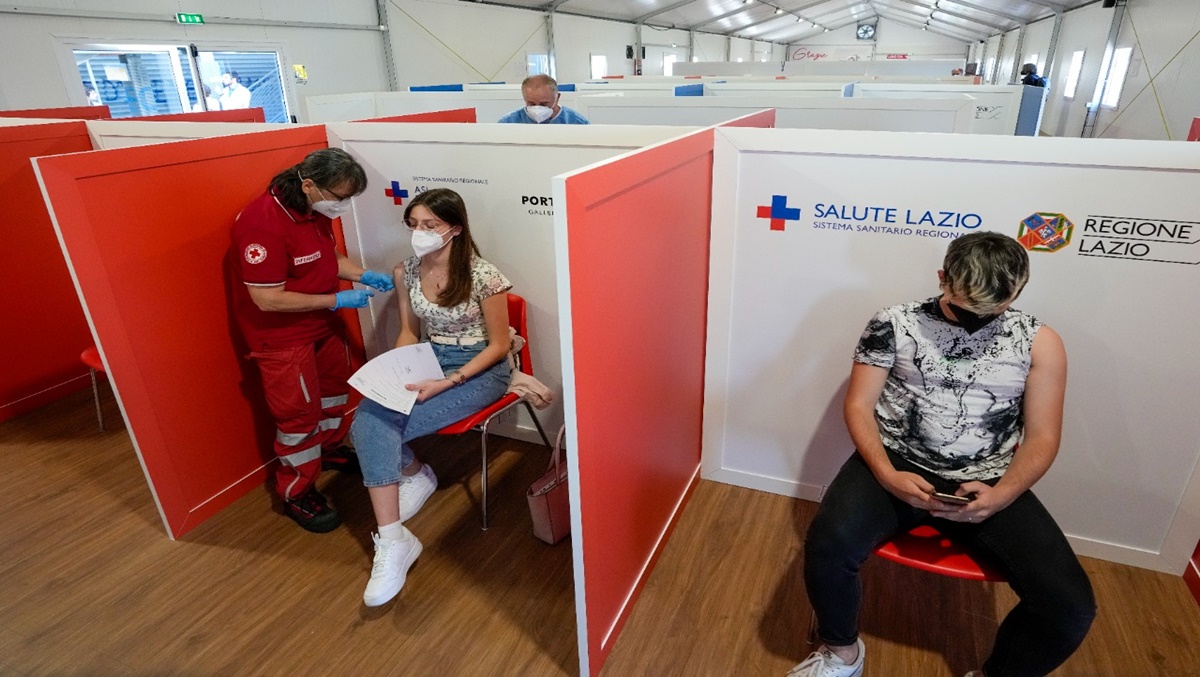 A student is administered her first dose of Pfizer/BioNTech Covid-19 vaccine, at a vaccination hub in a shopping mall in the outskirts of Rome, Tuesday, June 1, 2021. (AP)
A student is administered her first dose of Pfizer/BioNTech Covid-19 vaccine, at a vaccination hub in a shopping mall in the outskirts of Rome, Tuesday, June 1, 2021. (AP) The European Parliament on Wednesday gave a green light to the EU digital Covid-19 certificate, which would be given to those who have received the Covid vaccine, recently tested negative for the virus, or recovered from it.
These would be three distinct certificates, which would be accepted by all EU member states, allowing people to move freely and facilitate the gradual easing of restrictions in the 27 countries.
“The EU Digital COVID Certificate will function from 1st July, and will ensure safe and coordinated travel this summer. EU states are encouraged to refrain from imposing further restrictions, unless strictly necessary and proportionate, and it is reassuring that some are already issuing the certificate,” Chair of the Civil Liberties Committee Juan Fernando López Aguilar said, in a statement.
What is the EU Digital Certificate?
The certificate will be issued by a national authority, free of any cost, attesting that the person is safe from the coronavirus infection and hence, free to travel. It will either be in digital or paper format containing a QR code.
“A common EU framework will make certificates interoperable and verifiable across the European Union, as well as prevent fraud and forgery,” EU Parliament stated.
The system will be put in place on July 1 and remain for at least the next 12 months.
The certificates also exempt the holder from any additional travel restrictions such as quarantine, self-isolation, or testing, “unless necessary” for safeguarding public health. In case, a member state decides to impose restrictions, the measures would have to be notified, “if possible 48 hours in advance to other member states and the European Commission, and the public should be given 24 hours’ notice.”
Who is eligible for the certificate?
The European Parliament mandates that all member states must accept vaccination certificates issued in other EU countries for vaccines authorised by the European Medicines Agency (EMA). Presently, these include Covid vaccines by Pfizer-BioNTech, Moderna, AstraZeneca, and Janssen.
Individual countries can decide whether they will also accept certificates for vaccines “authorised following national authorisation procedures” or the World Health Organisation (WHO)-approved vaccines.”
The certificate can be issued irrespective of the number of doses, which would, however, be specified on the certificate.
However, being vaccinated will not be a pre-condition to travel. Those testing negative for the coronavirus will also be eligible for a digital certificate. RT-PCR tests and rapid antigen tests will be acceptable to obtain the testing certificate. The validity period for RT-PCR is 72 hours, and for RAT it is 48 hours.
Children can also get the Certificate if they receive Pfizer-BioNTech vaccine, test negative, or recover from Covid.
The European Commission has allocated 100 million euros under the Emergency Support Instrument to boost testing in the member states, in order to issue EU digital COVID test certificates.
A ‘gateway’ has been built by the Commission, through which all certificate signatures can be verified across the EU. The software has been built in a way to protect the holder’s personal data.
Several countries such as Bulgaria, Croatia, Denmark, Germany and Spain are effectively connected to the gateway and “issuing and/or verifying at least one EUDCC”. Whereas, countries like Austria, France, Italy, and so on, are technically prepared to connect to the gateway. Non-EU countries like Switzerland and Norway are also in the testing phase to connect to the gateway.
- The Indian Express website has been rated GREEN for its credibility and trustworthiness by Newsguard, a global service that rates news sources for their journalistic standards.

